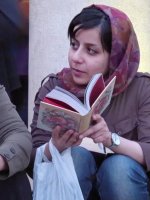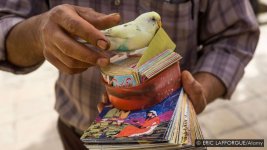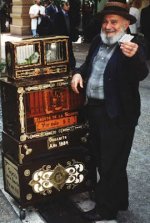Clarity,
Office 17622,
PO Box 6945,
London.
W1A 6US
United Kingdom
Phone/ Voicemail:
+44 (0)20 3287 3053 (UK)
+1 (561) 459-4758 (US).





Ah! It's a gorgeous country, with an incredibly rich culture! And yes, Shiraz is particularly lovely town, although my affections divided between it and Isfahan. I visited at a particularly difficult time, when there was a dramatic showdown with Israel and the riyal was dropping through the floor, which was causing a lot of pain, with some big disturbances in Tehran. Even so, people went out of their way to be friendly and hospitable. I have to say, it was also wonderful to be able to wander around those breathtaking historical sites without sharing them with more than a handful of other foreign tourists. Quite unlike any other country I've visited.Hello;
I'm Persian irfan. Among other things, we use the book of Hafez for asking the oracle, specially in love matters. There are interpretations for every poem written in some versions of the book.
There is also another common tradition for asking the oracle of Hafez: they put several pieces of paper in front of a lovebird. Any piece has a different poem with its interpretation. Then the lovebird chooses the poem for the querent.
I visited Shiraz many years ago. Lovely city with a special, tender atmosphere
Mary, I missed that. Isn't that delightful! Much nicer, really, than smashing open tortoises.There is also another common tradition for asking the oracle of Hafez: they put several pieces of paper in front of a lovebird. Any piece has a different poem with its interpretation. Then the lovebird chooses the poem for the querent.


Hi Mary and Irfan:Mary, I missed that. Isn't that delightful! Much nicer, really, than smashing open tortoises.
For the black mole on her cheek
I would give the cities of Samarkand and Bukhara



Mary, thank you for your wonderful description and examples!Besides, now several websites and applications offer Hafez divination.
Hi Mary:@Charly; lovely question!
like the I Ching oracle, you first concentrate on the question or the subject you want to know about. Many people then read "Fatiha" for Hafez ...
Are you talking about Divan versions prepared for divinatory use?As I said before, many versions of the book, and all the folded papers I've seen so far, have interpretations under every poem; which are comparable to the commentaries written on the hexagrams' lines. In other words, they make the understanding easier for you, however the interpretation of a poem may differ in various versions & you have better to find your answer through the verses of Hafez ..
1) I was in a group journey, and one fellow was an attractive guy I had fallen for, but knew wouldn't turn to a good partner for me due to past experience: he repeatedly cheated on his partner, had tried to flirt with my best friend, etc. I found it very hard to resist him and was melancholic.
Just considered my feelings in the situation and asked the oracle of Hafez ; I received the ballad number 119 that begins with:
A heart that has insight, that owns the Cup of Jamshid;
why should regret the momentary loss of a jeweled ring?
Don't take your heart to the coquetries of beggars;
give it to a king-like lover who respects it.
...
Hi Mary:@charly ;
Yes I'm talking about Divan versions. I don't know about the accuracy of English translations. Here you can find an article comparing them.
A pity, Clarke was available in archive.org, The article left me little hope with modern translators, although...The complete translation of the Dīvān by Lieut.-Col. H. Wilberforce Clarke (1840-1905) stands as an exemplum of the particularly graceless and dogmatic. A highly Sufistic interpretation, heavily interpolated with notes within the body of the literally-translated text, it offers a mass of unassimilated information, which obfuscates all the poetic qualities of its original.(Source: Enciclopaedia Iranica ).
Will try to find Lowthtan Bell.... one honorable exception is offered by the translations of Gertrude Margaret Lowthian Bell (q.v.; 1868-1926). Her versions are still the most lucid, musical and accurate of the verse translations. (Source: Enciclopaedia Iranica )
I asked because I am afraid that the ritual be very committed to the Islamic Religion and that a secular use of some formula could be interpreted as disrespectfulThe usual formulas of asking Hafez are the ones I explained; and as I said, you can skip them and just think about your question.
I suspected it from the beginning. The fact that you have translated it yourself may explain the relative ease of understanding. If one get a good book, even if maybe not complete, the lack of ballads' numbering is not a problem for using the book for consultation with Michael's method.I rendered the mentioned verses in my comment, and they were at the beginning of poems. I wrote the number of ballads so that you can find them, however it may differ in other versions.
I was aware that there are not only linguistic knowledge problems but also cultural. I don't know why I thought the Cup Of Jamshid as something like a "Cup of Cups" meaning the more worthy inner gif wich is the CAPACITY OF LOVE that every one receives because we had a mother. Maybe I was excessively assertive but I always knew that any expression bears much more than a single meaning.The Cup of Jamshid is a cup of divination, which in Persian mythology was long possessed by the rulers of ancient Greater Iran. Having the Cup of Jamshid (Jaam-e Jam) is a metaphor for being aware of the mysteries of universe, going beyond what the eye sees; but also having a wealth, an inner one in particular.
I cannot believe that somebody like Hafez could believe that every king or noble was GOOD. Maybe it happens like with the JUNZI in the Changes, the NOBLE in Wilhelm translation but a PERSON OF NOBLE CHARACTER for some modern Confucian writers.The jeweled ring, here, is a symbol for the material wealth. Hafez means when you posses something as valuable as the Cup of Jamshid, why should you regret the temporary material losses?
Being king-like here means being noble.
Sometimes happens that mediocre lovers can be good , kind hearted people, but in matters of love it is not always enough. Respect is essential, an abusive person cannot truly love.The overall meaning: you have a big heart which is a valuable possession; so don't regret the loss of a mediocre lover who doesn't value it. Give your heart to a great person who respects it.
The invocation may be phrased with some references to God and the prophets, but on the whole, its surprising how little importance religion seems to have to most Persians. A lot of people seemed to be more focused on Darius the Great and the old history rather than Islam. And the people are generally really surprisingly secular and cosmopolitan. The only other two countries I've seen that are similar are Indonesia and Turkey. In all three countries, Islam is a tiny part of the peoples identity. Coming from a Sunni majority country, I was absolutely stunned to see some mosques in Iran that had fire motifs in the design -- a nod towards Zorastorianism. That would be unbelievably shocking in a Sunni country, where any friendly recognition of any religion or tradition other than Islam would be a grave sin. Persians have lots of traditions and rituals that don't owe much to Islam.I asked because I am afraid that the ritual be very committed to the Islamic Religion and that a secular use of some formula could be interpreted as disrespectful
Hi Mary:@charly
I write the Persian text. Maybe there are errors in my translation. You can find other translations elsewhere:
...
P.S: I just found this forum where the poems of Hafez are posted with English translation. You can find the above ballad in the link.
THE ART OF FIGURAL CALLIGRAPHY
by Jila Peacock
I was born in Tehran to an English mother and Iranian father, and, although English was my mother tongue, my first written language was Persian, which I studied from the age of seven at my Iranian primary school. I remember being introduced at that time to snippets of Ferdousi in my first textbooks, to Sa‘di, my father’s favorite poet, and Edward Fitzgerald’s translations of Khayyam, which my mother would always recite by heart. My introduction to Hafiz came much later in life.
After reading the 81 poems of the Dao de Jing on a working visit to China as a young doctor in 1977, I became interested in the ideas in these teachings of “emptiness” and “oneness of all things.” Naturally I found myself seeking out similar universal ideas in Persian mystical poetry, and more than any other poet, reading the ghazals of Hafiz of Shiraz became my quest. At a family gathering after my father’s funeral, I asked my Iranian cousin Behnoosh to do fālgīrī for us by selecting a poem from Hafiz’ collected works, or Divān. fālgīrī, meaning fortune-telling or divination, here specifically refers to divining by means of the poetry of Hafiz, which is the most popular form of divination in Persian culture.
The poem that was “given,” number 172, happened to be a well known favorite and ten years later became the poem from which I made the image I call the “Perfumed Deer.”
What is astonishing about Hafiz’ work is that it can be interpreted in so many different ways. This is because his creative use of symbol and metaphor, internal rhyme and repetition, makes the meaning metamorphose with each new reading, giving a sense of the poem hovering, just beyond the reach of reason.
Source: Sufi Journal
That reminds me of the story of the poor, uneducated, bumbling Russian who was employed by a Japanese company run by old fashioned Japanese aesthetes and made to participate in their incomprehensible rituals. One evening, they were sitting around, drinking sake, spontaneously composing haiku. He suddenly rebelled and shouted out: "What need have we to compose poetry when there are stars in the sky and sake to drink?"After reading a few I feel like I need to start drinking wine, maybe that's all one ever need do?
Clarity,
Office 17622,
PO Box 6945,
London.
W1A 6US
United Kingdom
Phone/ Voicemail:
+44 (0)20 3287 3053 (UK)
+1 (561) 459-4758 (US).